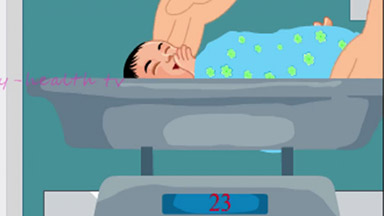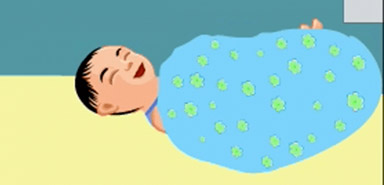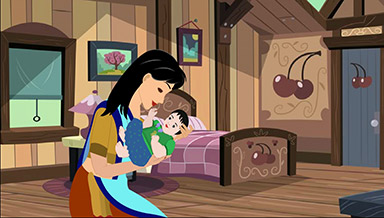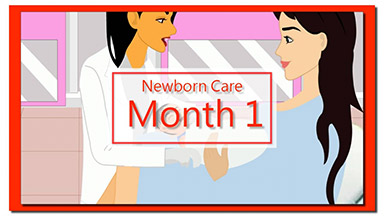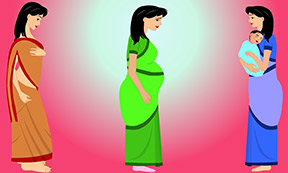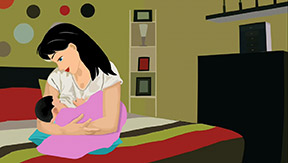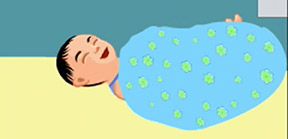Displaying items by tag: newborn
नवजात शिशु की स्क्रीनिंग परीक्षण
आखिर यह शुभ दिन आ ही गया है। आपने अपने बच्चे को पहली बार अपने गोद में लिया है। बधाई हो! अंजलि, जो हमारी शृंखला के मुख्य किरदार है, चिंतित है की अपने बच्चे के सात सब कुछ ठीक है की नहीं। अंजलि अपने डॉक्टर से यह जानना चाहती है की वह कोई परिक्षण है जिससे अपने बच्चे में नवजात बीमारियों की उपस्तिथि को पता लगा सके।
- नवजात शिशु
- newborn
- newborn care
- नवजात शिशु देखभाल
- नवजात शिशु स्क्रीनिंग परीक्षण
- नवजात शिशु स्क्रीनिंग टेस्ट्स
- newborn screening Tests
- Baby care blogs in Hindi
- नवजात शिशु देखभाल ब्लॉग हिंदी में
- बच्चे में मेपल सिरप मूत्र रोग
- Maple syrup urine disease in babies
- बच्चे में जन्मजात अधिवृक्कीय अधिवृद्धि
- Congenital Adrenal Hyperplasia in babies
- बच्चे में ग्लूकोज 6फॉस्फेट डीहाइड्रोजनेज की कमी
- Glucose6Phosphate Dehydrogenase Deficiency in babies
- Phenylketonuria in babies
- फीनैलकेटोनूरिया बच्चे में
- galactosemia
- गैलक्टोसेमिया
- Sickle Cell Anemia in babies
- बच्चे में दरांती कोशिका अरक्तता
- Hearing Test for babies
- बच्चों के लिए कान कि जाँच
ಶಿಶುಗಳಲ್ಲಿ ಶಬ್ದಭರಿತ ಉಸಿರಾಟ
ಹೊಸ ಅಪ್ಪ-ಅಮ್ಮಂದಿರು ನನಗೆ ನವಜಾತ ಶಿಶುವಿನ ಬಗ್ಗೆ ಪ್ರಶ್ನೆಗಳನ್ನು ಕೇಳುತ್ತಾ ಇರುತ್ತಾರೆ. ಅದಕ್ಕಾಗಿ ನಾನು ನವಜಾತ ಆರೈಕೆ ಮತ್ತು ಅಭಿವೃದ್ಧಿಯ ವಿವಿಧ ಅಂಶಗಳ ಮೇಲೆ ಕೆಲವು ಲೇಖನಗಳನ್ನು ಬರೆಯಲು ನಿರ್ಧರಿಸಿದ್ದೇನೆ.
- noisy breathing
- noisy breathing in babies
- newborn
- newborn breathing
- baby care blogs
- baby care blogs in kannada
- ಶಿಶುಗಳಲ್ಲಿ ಶಬ್ಧಸಹಿತ ಉಸಿರಾಟ
- ನವಜಾತ ಶಿಶು
- ನವಜಾತ ಶಿಶು ಆರೈಕೆ
- ನವಜಾತ ಶಿಶುವಿನ ಉಸಿರಾಟ
- ನವಜಾತ ಶಿಶು ಆರೈಕೆಯ ಬ್ಲಾಗ್ ಗಳು
- ನವಜಾತ ಶಿಶು ಆರೈಕೆ ಕನ್ನಡ ಬ್ಲಾಗ್
- causes of noisy breathing in newborn
- ನವಜಾತ ಶಿಶುವಿನ ಶಬ್ದಭರಿತ ಉಸಿರಾಟದ ಕಾರಣಗಳು
- ಶಿಶುಗಳಲ್ಲಿ ಶಬ್ದಭರಿತ ಉಸಿರಾಟ
- newborn care and development
- ನವಜಾತ ಆರೈಕೆ ಮತ್ತು ಅಭಿವೃದ್ಧಿ
नई माँ को बधाई!
नई मां को बधाई। आपने एक सुंदर बच्चे को जन्म दिया है। आप खुश हैं और पूरे परिवार भी। पहले कुछ दिन आपके बच्चे की देखभाल करना कठिन होगा। आपका बच्चा इस दुनिया में नया है और भोजन या नींद की आदतों के मामले में कोई पूर्व निर्धारित पैटर्न नहीं है और आपको ये जानने में मुश्किल होगी की वे क्यों रो रहा है - क्या उसे भूख लगी है? क्या उसे नींद आ रही है?? क्या वह दर्द में है? क्या यह डायपर की वजह से रो रहा है? क्या यह तापमान की वजह से रो रहा है?
Newborn Baby sleep
The time has come and your baby has arrived, your bundle of joy is in your hands now and as a mother, you can go through mixed feelings of joy, excitement and sometimes anxiety. Both Yourself and the baby may be exhausted from the events of labor and delivery. This is quite normal. It’s a good idea to keep visitors away for the first day at least and concentrate completely on your baby’s needs.
Congratulations to the new mom
Congratulations to the new mother. You have delivered a beautiful baby. You are happy and so is the entire family. The first few days are going to be tough taking care of your baby. Your baby is new and does not have any prefixed pattern in terms of food or sleep habits and you can be lost figuring out what his/her cry means - Is he/she hungry? Is she/he sleepy? Is she/he in pain? Is it the diaper? Is it the temperature?
Newborn Screening Tests
The day has arrived and you have given birth to a beautiful baby. Congratulations! Anjali, the protagonist of our Series was a little concerned if everything was normal with her baby. She wanted to find out form the Doctor about any tests which are advised to check for any newborn diseases.
Initiation of breastfeeding
Early initiation of breastfeeding, exclusive breastfeeding for the first six months of life followed by continued breastfeeding for up to two years and beyond with adequate complementary foods after completion of 6 months of age is the most appropriate feeding strategy for infants and young children.
Noisy breathing in babies
I have new parents asking me questions about newborn babies and thus decided to write a few articles on various aspects of newborn care and development. A newborn baby breathes more rapidly than an adult. An adult takes about 18-20 breaths in a minute compared with a newborn, who breathes in and out around 40-60 times/minute. This is because Newborn’s don’t have the lung capacity to hold a lot of oxygen so they need to breathe in and out more often.

